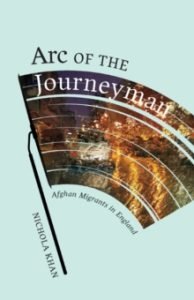This book is based on research with a group of South Eastern Afghan Pakhtuns settled in Brighton, England. The men are first generation refugees with low educational attainment and work as taxi drivers, cooks, kitchen porters etc. These Pakhtuns maintain links with their exiled families in Pakistan and the author journeys on trips back to Pakistan with her Pakhtun research subjects. The author’s research highlights that Pakhtuns are transnational and are not tied to an integrated territorial entity. The authors research methods involve assessing life history work and labour migrations, exile, displacement as well as evaluation of nighttime dreams.
The author develops the argument that movement and motion “neglect how… premodern societies, drawing continuities between post and present to critique the notion of the contemporary “refugee crisis”-arguably better conceived as the contemporary refugee normality …Afghan spatial mobility and dispersion are long-standing economic and political “strategies” linking mobile people for whom return is neither feasible nor desirable.”
Khan travels back to Pakistan with these British Afghan men and journeys out in cars for picnics as the men enjoy themselves besides the Indus providing sumptuous fish barbecues. As the men let their hair down they joke with one another. An Afghan Pakhtun who is based in Peshawar and thus poorer than his England based hosts, is told by his British Afghan friend named Simakai, enjoy yourself ‘“you don’t eat karahi (meat dishes) at home, here you eat free!”. To take him down Mujibur began joking about Simakai’s wife. The author explains ”reputation …rest precariously in ribaldry, acuity, and a cut-and-thrust verbal jousting style ..that establish social reputation, masculine identity and power. Jokes like “You can sleep with my wife!” outrageously reverse the imperative to protect one’s wife’s sexual honour (namus)”.
The men delight in playing cricket, Attan and football together. Encounters with the Pakistani police in Khyber Pakhtunkhwa are detailed, in one instance a Pakistani policeman at a checkpost demands with misplaced expectation, ‘Refugee, you have arrived to fill my pockets” the Afghan retorts ‘This is my land! Be careful where you tread!’, speeding off and leaving the policeman’s pockets bereft of ill-gotten gains. The bulk of the Afghan refugee population from Pakistan has been forcibly removed to Afghanistan since 2014.
One of the taxi drivers named Zmarai finds that his dreams of wealth in England are misplaced with the burden of having to remit £1000 per month to his family per month. The taxi driver suffers from depression, further complicating his ability to work and support himself and his family. Zmarai falls in love with a teacher in Brighton. However, Zmarai soon feels the sting of rejection, when his short-lived affair comes to an end as a consequence of the teacher finding out that her ‘man’ is married, with children. Ironically, a party going passenger presents Zmarai with his fancy dress King’s crown, which Zmarai proudly retains upon his taxi dashboard. Rather like ‘The Man who would be King’ Zmarai finds the majestical promises of the Imperial land far from bright amongst the oriental pavilions of Brighton. Zmarai’s depression worsens as he finds that life is hopeless and seeks relief in death. As the author narrates: Zmarai and I were watching the Pashto film Kabar la Zawal da (arrogance will lose) …In the film, Pashtun morality and ideals were engaged through the tragic story of an over indulgent father whose son, wilful and self-indulgent, ruined his family. Afterward, Zmarai uttered uncharacteristically, “It’s hopeless”. He continued “I’ve stopped. I’ve worked hard. My friends are buying homes, bringing their families here. I should be going up. I’ve shown nothing to the world, or myself. I’m not moving. Ze der khapa yum (I am very upset)”.
Some of the men listen to Taliban songs, others watch Pashto movies, others still party at the beach where the men could eat and relax together. Though there were also Pakistani Pakhtuns in Brighton the two groups did not mix. The Afghan Eid Barbecue was also limited to Pakhtuns though the author was surprised when one year the Tajiks, Uzbek and Hazaras were also invited to participate. As the Eid celebrations became more elaborate, rubab players would attend and play under a large pavilion tent as the British heavens poured down an accompaniment of rain. The Eid festivities were seen to be ‘political’ in that the organiser sought leadership of the Afghan community and demonstrated his political acumen by ensuring that his and his alone was the only Afghan Eid barbecue.
Khan details the battles for ‘political power’ in the community between two family based groups of Pakthun taxi drivers to set up an Afghan Community Organisation and host an Eid barbecue. The female relatives of the taxi drivers look with askance at the antics of their menfolk? whom appear to think are competing for the post of Afghan President, replete with threats of violence to their rivals when the rivals attempt to compete by hosting their own Eid Afghan Community barbecue. The offspring of these drivers attend University and look to progress through British society in ways that their migrant fathers and mothers could not.
Following on from Frederick Barth’s study of the ‘Political leadership amongst the Swat Pakhtuns’ this is an important new study examining transnational Pakhtuns as they move back and forth between London, Peshawar and Brighton. Barth’s theories on Pakhtun community power play are also evaluated along with those of Akbar Ahmed and Robert Canfield.

Arc of the Journeyman Afghan Migrants in England (2020)
Minnesota University Press
Nichola Khan